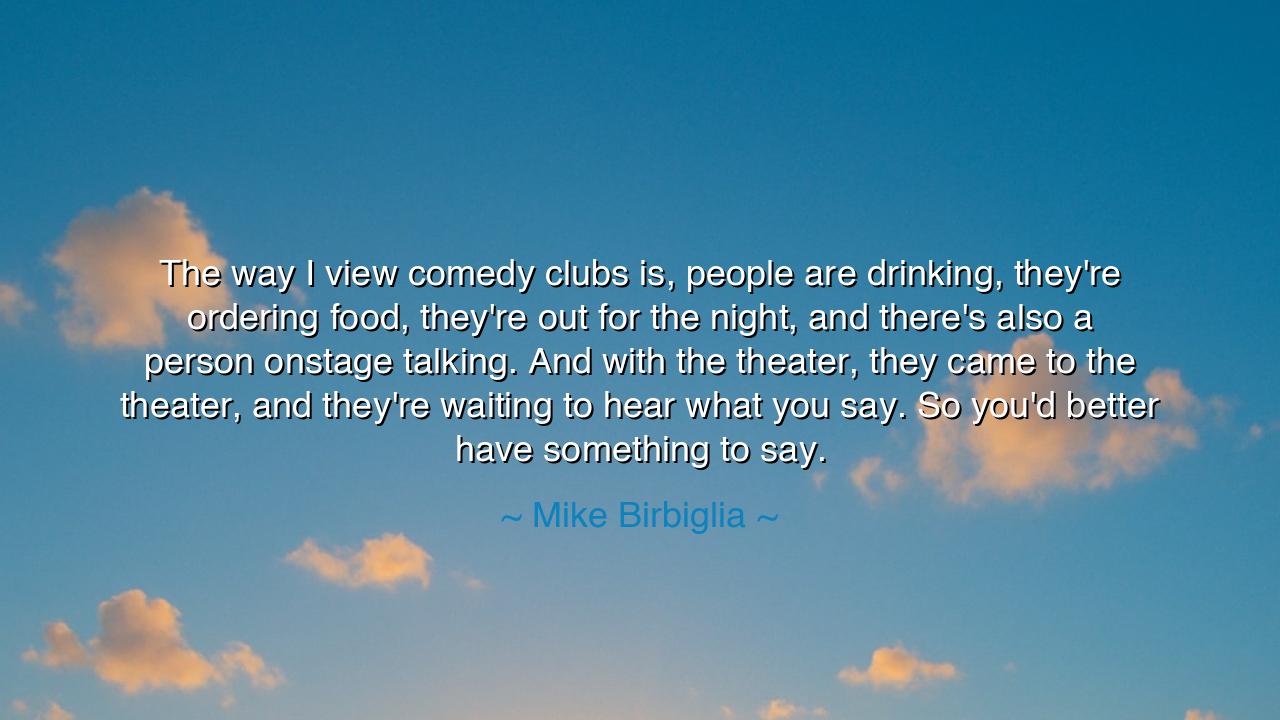
The way I view comedy clubs is, people are drinking, they're
The way I view comedy clubs is, people are drinking, they're ordering food, they're out for the night, and there's also a person onstage talking. And with the theater, they came to the theater, and they're waiting to hear what you say. So you'd better have something to say.






Host: The faint hum of the city outside is a distant murmur, muted by the cozy walls of the apartment. Jeeny sits on the couch, her legs crossed, sipping from a mug, while Jack leans against the window, looking out at the rainy street below. The lighting is soft, the warm glow of a single lamp casting shadows that stretch lazily across the floor. The night feels like it’s holding its breath, waiting for the conversation to unfold.
Jeeny: (her voice thoughtful, almost playful) “I’ve been thinking a lot about the difference between comedy clubs and theater lately. I mean, the vibe is so different, right? People go to a comedy club to just let go. They’re there to drink, eat, relax—and the comedian is just part of the whole experience.”
Jack: (without turning, his voice dry but tinged with curiosity) “Yeah, comedy clubs are more about the atmosphere. It’s casual, laid-back. People are expecting to laugh, but they’re also doing other things. You know, eating, chatting, getting their drinks.”
Jeeny: (nodding, her eyes lighting up with the thought) “Exactly! And Mike Birbiglia said something interesting about it. He said, ‘The way I view comedy clubs is, people are drinking, they’re ordering food, they’re out for the night, and there’s also a person onstage talking. And with the theater, they came to the theater, and they’re waiting to hear what you say. So you’d better have something to say.’”
Jack: (turning to face her now, his arms crossed, voice skeptical) “So, you think there’s more pressure in theater than in a comedy club? Because the audience is waiting for you to actually say something important?”
Jeeny: (her eyes gleaming with the quiet energy of the conversation) “I think so. In a comedy club, people are there to have fun, right? They don’t need everything to be meaningful. But in the theater, it’s different. People go because they want to experience something—they’re engaged, listening, expecting more than just laughs. There’s an unspoken contract between the performer and the audience.”
Host: Jeeny’s words fill the space between them, a subtle tension creeping in as the conversation deepens. Jack remains silent for a moment, his gaze drifting back to the window, lost in thought. The world outside continues its steady pace, while the room holds a quiet, thoughtful pause.
Jack: (his voice quieter, almost reflective) “But is it really that simple? I mean, a comedy club might not be as formal as the theater, but the best comedians—like Birbiglia—still have something to say, right? It’s not just about getting laughs. It’s about the message behind the humor. In both places, you’re still sharing your perspective. Just because one is more casual doesn’t mean it’s any less important.”
Jeeny: (smiling softly, her eyes warm with recognition) “I agree, Jack. The best comedians do have something to say. But the environment is different. In the theater, you’re right in front of an audience that is there to take you seriously—at least in a certain way. You can feel that weight in the air, that expectation that you’re going to offer something meaningful. Comedy clubs are about creating a moment where people can forget everything else, but in the theater, they’re hanging on your words, waiting for you to say something that’s going to make them think.”
Jack: (nodding slowly, as though the pieces are falling into place for him) “So, the theater’s like a different kind of performance. There’s more pressure to deliver because the audience is there for the experience. They want something that speaks to them—something that resonates. In a comedy club, you could get away with a lot more, because people are there to relax and have fun.”
Jeeny: (with a small laugh, her tone playful but still thoughtful) “Exactly. But that’s also what makes it so powerful, right? When a comedian can do both—take that fun, laid-back atmosphere of the comedy club and turn it into something that actually makes people think, something that matters. It’s like taking something light and making it meaningful.”
Host: There’s a subtle shift in the room, a realization settling between them, like a thread connecting the two perspectives. Jeeny smiles softly, her gaze gentle but full of quiet understanding. Jack, still leaning against the window, looks back at her, the skepticism in his expression slowly softening.
Jack: (his voice calmer, with a hint of admiration now) “So, in the end, it’s all about the connection you make with the audience, no matter the setting. Whether it’s a comedy club or a theater, it’s about how you can reach them, get them to really listen.”
Jeeny: (nodding, her smile widening slightly) “Exactly. Comedy, like any art, is about communication. It’s not just about making people laugh—it’s about making them feel something. Comedy clubs may be more relaxed, but the challenge is still there. In both spaces, you’ve got to have something to say. Something real.”
Host: The room feels quieter now, filled with the weight of the conversation. Jack straightens up, as though the idea has settled into him in a new way, while Jeeny watches him, the quiet satisfaction of understanding shared between them. The city outside continues its rhythm, and in that moment, both of them see that no matter where you perform, the heart of it is the same—the power of words and the connection they can create.






AAdministratorAdministrator
Welcome, honored guests. Please leave a comment, we will respond soon